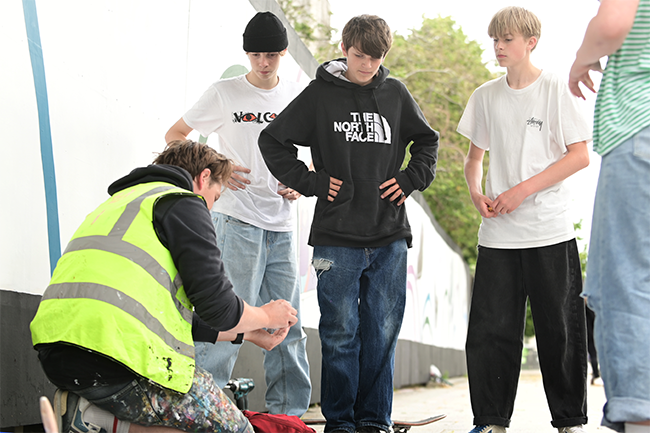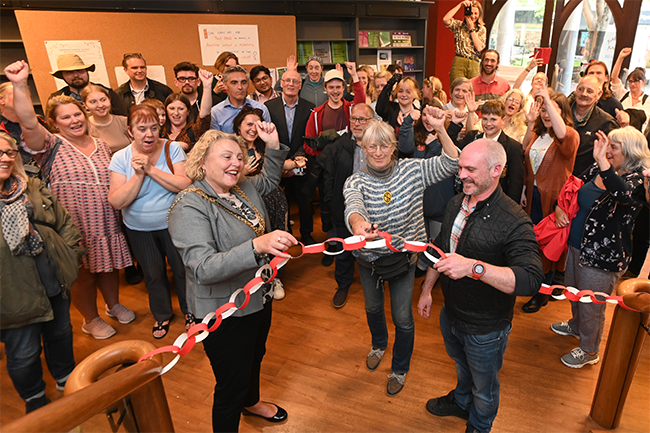As part of the post-Covid city centre plan Plymouth Culture developed and launched a programme of meanwhile use, taking on empty units and activating them as spaces for creative and cultural projects. The objective was to look beyond simply driving footfall to reimagining the high street.
The challenge
Like all struggling high streets across the country, the pandemic made an already difficult situation impossible. Plymouth city centre is perhaps even more challenging because the local authority owns very little of the building stock, with many of the private landlords being pension companies or large holding companies with limited personal interest in the city. Added to this is the fact that Plymouth has an over-supply of retail space with as much square footage of retail space as some major cities and a current vacancy rate of approximately 18 per cent.
But Plymouth Culture started to ask a different set of questions – what if we stopped trying to revive the high street and started to reimagine it? What if, instead of asking artists and cultural organisations to make an area look good and then tell them to leave when it is back on its feet, we invite the creative and cultural sector to be part of the fabric of the city centre? What if we focused on changing the culture of the high street to one of experience and exchange rather than simply transactional?
Would it be possible through this approach to give the high street a new purpose; one that could better meet the needs of communities in a post-Covid world, respond to behaviour change and become future facing.
The solution
We know the concept of meanwhile use is not new but we felt that Plymouth had all of the components necessary to be ambitious and use it as a strategic tool rather than a short-term tactic. One of the city’s strengths is its collaborative approach to partnership working. The first step was to bring together a partnership including the Plymouth City Council, Plymouth City Centre Company (BID) and Plymouth Culture. From the outset we thought about long-term legacy and so also invited Vacancy Atlas into the partnership, an innovative enterprise taking a radical approach to matching people with ideas to places and spaces across the city, because we wanted the activity to live on beyond the life of any funding.
By bringing the partners together we were able to pool funding streams. We got permission from funders to bring a number of projects together into one cohesive city wide meanwhile use programme, including funds from Historic England’s High Street Heritage Action Zone, Interreg funding from the C-Care project and local authority high street recovery funding.
We then made a concerted, collective approach to ask landlords to offer empty property on a rent-free basis for meanwhile use. In parallel to this request we launched an open call for creative and cultural initiatives to enable us to match projects to spaces.
The partnership is critical to the success of the programme. From the perspective of the landlords, it is essential that there is one programme and one coherent message that we all back so that it is seen as a city-wide initiative and not just another individual request for space. It also ensures meanwhile use is seen as contributing a part of the solution to the wider, strategic vision for the high street.
The impact
As a result of the project we have, to date, secured six empty units within the city centre.
Vacancy Atlas – working with Vacancy Atlas and the local authority we have secured a two-floor council owned unit on a five-year lease with the first year rent-free. During this first year we are creating a rolling programme of pop-up events, workshops and exhibitions to support hundreds of creatives.
Climate Hub – working with the polar explorer Antony Jinman we have secured a four-floor building, previously occupied by Waterstones, to develop a climate hub. This is serving as a central place for multiple projects and partners to deliver work that engages the public in the conversation about the climate emergency.
Bike Space – working with British Land we have enabled a local not-for-profit social enterprise, Bike Space, to establish a city centre offer in partnership with Zedify. This will offer the last mile delivery by bike to local businesses to lower carbon emissions in the city.
Civic – Civic are a partnership between KARST contemporary art gallery, Take A Part and Primeskate park to engage the young skater community in shaping the future of the city centre by celebrating the skater heritage within Plymouth. They are co-creating artworks with the skaters which are already starting to appear in public spaces across the city.
Sprite Arts Collective – a collective of artists and researchers have created a programme of work to be exhibited, screened and showcased in a unit previously occupied by Nandos. The work looks at the heritage of the city and engaging the public in a conversation about what Plymouth has and what it could be.
Artist gallery - an artist has brought together a collective of local and regional artists to create a gallery on the high street. They want to change the perception of the inaccessible white cube gallery and make art available to all.
We will shortly launch our round two programme to enable more initiatives to make use of the units. In addition to supporting these organisations and engaging the public, the project has opened the door for conversations with other city partners and future funding opportunities.
How is the new approach being sustained?
The partnership is here for the long-term and is committed to reimagining and activating the high street through initiatives such as meanwhile use. Whilst funding obviously influences what is possible, the partnership continues to collaborate and create opportunities for cultural organisations.
As a result of the meanwhile pilot project the partners understand the value of culture and the role of temporary interventions to drive change. As such we are exploring opportunities to build meanwhile and pop-up opportunities into other city developments and regeneration work. We are considering best practice examples from across the country to understand how this might be embedded at a policy level to guarantee continuation.
On a practical level we have documented the meanwhile programme and created toolkits and templates for other organisations looking to acquire space, enabling them to more easily navigate the process. We feel this shares the knowledge and allows versions of the programme to emerge. We will publish a Future Cities Blueprint later this year for further dissemination of learning.
We are pleased to say a number of the projects have used the meanwhile programme to pilot their work and are now looking for a permanent home on the high street. This means that cultural activity will have a presence in the city centre as a result of the project.
Lessons learned
Change requires patience and transformation takes time. Working with multiple partners, mixed funding streams and private landlords is challenging. We all have different processes and work at difference paces which don’t always align. We have experienced significant delays in securing and opening spaces and recognize the need for clear communication to manage expectations on all sides.
Meanwhile use is not in itself the solution to the high street challenge. It needs to be seen as a piece of the wider jigsaw and therefore embedded in the strategic plan and vision for the city. This is needed so that it gets partner backing and aligns to other strategies making it more than a one-off project and instead a strategy for transformation.
Contact
Hannah Harris, email:[email protected]


